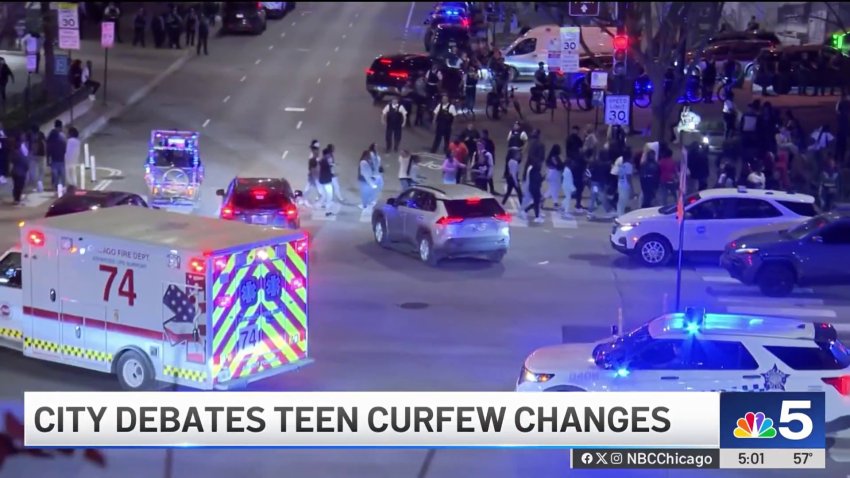Mayor Johnson’s Stand Against Teen Curfew Stirs Political Tension
Mayor Brandon Johnson has vowed to veto the recently approved teen curfew regulation, attracting determined opposition from the main advocate of the bill. Alderman Brian Hopkins from the 2nd district overshadowed Mayor Johnson during the Wednesday City Council meeting, securing a 27-22 victory in a vote granting the police superintendent the autonomy to invoke teen curfews at will. However, this triumph may be short-lived as Johnson swiftly pledged to exercise his seldom-used veto power, the first instance in the city since 2006.
This impending veto implies that Hopkins must secure support from at least 34 council members to reject the mayor’s veto—an immense hurdle that compels him to sway up to seven council members. Despite these odds, Hopkins announced that he would commence the City Council’s voting process on the mayor’s forthcoming veto in July. He intends to continue championing his legislation without resorting to undue influence.
During a Thursday morning address, Hopkins stressed, ‘I will persist in countering the misleading narrative, but I won’t force my colleagues. Everyone will cast their vote based on their personal beliefs.’ This remark comes from the alderman primarily responsible for the downtown region. Johnson’s imminent veto and Wednesday’s vote signify critical strides in Hopkins’ two-year campaign geared towards allotting more power to police to tackle disruptive teen assemblies which morph into escalated violence, having recently witnessed two notable shootings in his jurisdiction in Streeterville.
However, young activists and civil rights organizations have heavily criticized the curfew rule as an unjust and unconstitutional step that disproportionately affects underprivileged Black and Latino teens. They argue that these adolescents lack alternatives for safe recreation and have been sidelined from the ongoing debate. Instead, the aldermen should allocate resources in providing jobs for the youth, introducing initiatives to prevent violence, and organizing secure activities.
Abierre Minor, 25, who was appointed by Mayor Johnson last year to the Community Commission for Public Safety and Accountability, said, ‘Our children gather to escape the violence in their neighborhoods, their problems at home, and other circumstances beyond their control.’ She narrated her post-vote conversation with her younger sister, who felt that the media’s portrayal of these teenage gatherings has been exaggerated and biased.
Minor’s sister insisted on the universal right to peaceful assembly. In her response to the City Council’s majority decision, Minor expressed disappointment but also lauded Mayor Johnson’s swift and decisive veto declaration. She criticized the enactment of stifling and inefficient policies by decision-makers annually. However, this year, Minor stated, was different, ‘This time, we have a leader who chose to break the pattern.’
Several progressive groups and the Cook County public defender’s office have rallied behind Johnson’s opposition to the legislation. Speaking of the mayor, his administration is currently tailoring language to officially veto the measure soon. Johnson has often expressed skepticism about the potential curfew and has significantly stepped up his disapproval in recent days.
Post-declaring his veto commitment, Mayor Johnson conveyed that the curfew regulation would undermine ‘trust within communities’, especially during this phase of a significant decline in violent crime rates. He equated the ordinance with previous crime laws that predominantly led to the unjust criminalization and imprisonment of low-income and primarily people of color. ‘Perpetuating expanded police authority, unchecked and unbalanced, hasn’t gone well for Black and brown people in this country,’ Johnson stated.
On Thursday, Hopkins disputed the tag ‘snap curfew’ initiated by Johnson and others, arguing that such characterization incorrectly represented the ordinance. The legislation would mandate that police provide at least 30 minutes warning onsite prior to implementing a curfew and obligate the superintendent to consult others before declaring a curfew, granting the superintendent ultimate authority. Superintendent Larry Snelling clarified in court last week that he did not intend to invoke sudden curfew powers.
However, Snelling suggested that if he were alerted about upcoming disruptive gatherings, he could potentially enact proactive curfews days ahead. Johnson contended that he and Snelling share similar views on this issue, but emphasized that future superintendents should not have the authority to swiftly declare curfews without significant oversight.
Hopkins is keen to proceed with a final vote in July without any unfair strategies from either party. ‘This should conclusively resolve the matter, and it’s preferable to do it quickly than to deteriorate into a messy legislative battle,’ he stated. ‘At this point, I believe I have finished holding persuasive dialogues with my fellow council members.’
Hopkins foresaw potential developments precipitating the mid-July vote that could pressure council members to reconsider their views. Hopkins referenced the occurrence of a large, disruptive teen assembly at North Avenue Beach, an incident he had similarly highlighted during the Wednesday City Council debate. The local law enforcement authorities reported that they arrested five teens at the beach on Tuesday, including three minors, on charges ranging from battery, resisting arrest, to possession of alcohol.

